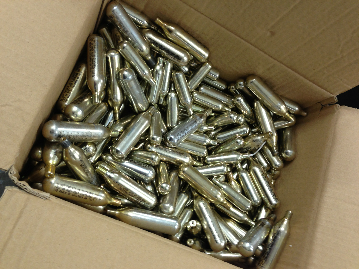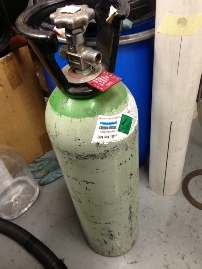There has been a reasonably significant volume of testing conducted to evaluate the
reliability of the device - both lab and flight testing. This includes over 20 flights
using the device as the sole deployment instrument and multiple hundreds of ground
tests simulating an in-flight deployment.
Both 8g & 16g CO2 soda canisters and industrial CO2 cylinders were used to supply
the working gas for such testing:
Results: Over the hundreds of ground tests, there has been no failures or anomalies
experienced apart from a filling issue on 1 or 2 occasions (if filled too quickly,
the check valve o’ring can extrude around the ball. The potential for this to occur
can be designed out easily.
The same could almost be said for the flight results but with one single exception:
in 2010 I experienced a complete recovery failure at a launch just outside Perth
in WA. However, the cause of this failure is of no certainty as (1) there was an
11th hour ad hoc battery change for the flight electronics and (2) during this process
a LiPo battery next the electronics was accidentally drilled through resulting in
an intensely exothermic explosion that could have damaged the electrical/electronics
system and (3) the backup pyrotechnic charge also failed to fire for that flight.
Such a combination of events could intuitively indicate a higher likelihood of an
electrical or electronics failure.
Every flight since then has been a complete success with no installed redundancy
implemented after the 2010 failure.


